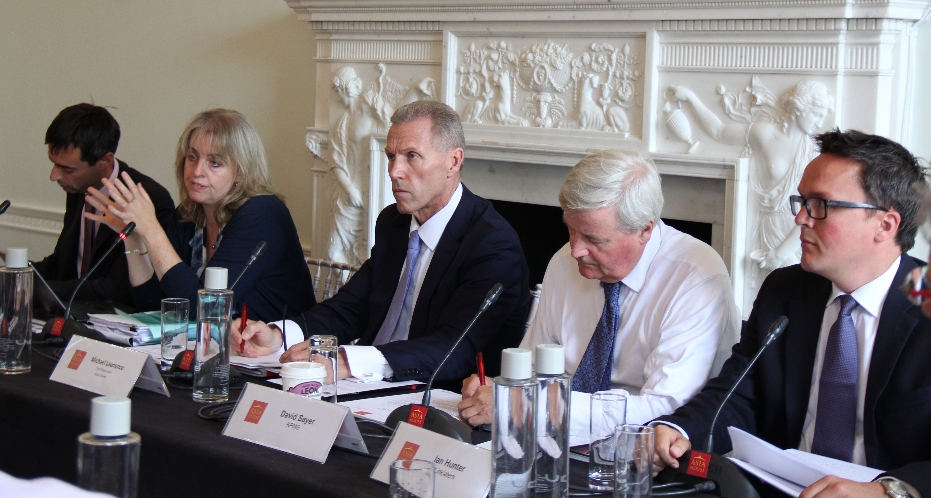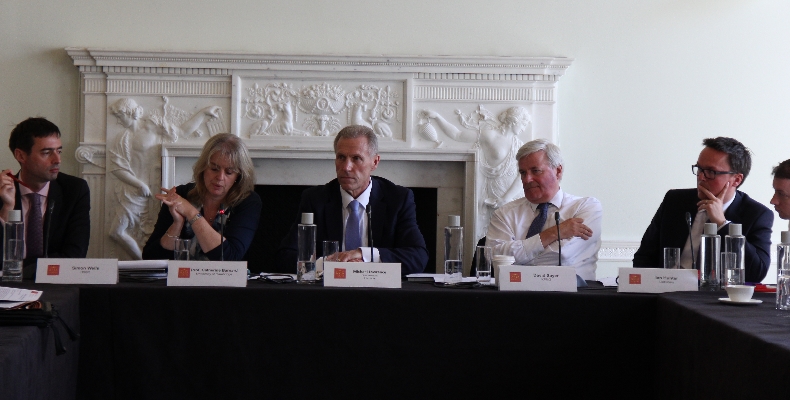Driving commercial and political engagement between Asia, the Middle East and Europe
Driving commercial and political engagement between Asia, the Middle East and Europe
Driving commercial and political engagement between Asia, the Middle East and Europe

Brexit has led to a cloud of uncertainty hanging over British business.
There are real fears over passporting rights in the EU and also whether banks and insurance companies headquartered in the UK will end up relocating to mainland Europe leading to job losses in the UK.
Airlines and professional companies may also be affected by the decision to withdraw from the EU. So how should businesses respond?
The possible impact of Brexit on the British economy and how businesses should respond were among the topics discussed by high-flying business figures in a panel discussion at a seminar held at Asia House in London last week.
‘Asia House Brexit Series: Implications for Business’ was opened by Catherine Barnard, Professor of European Union Law, University of Cambridge, who explained the legal procedures behind triggering Article 50. This was followed by a panel discussion.
One of the panellists David Sayer, Senior Partner & Member of the Board, KPMG UK LLP, said Brexit “was not the biggest issue” that European governments were facing. He said Europe was dealing with a lot more than Brexit, namely migration, Islamic terrorism, and “issues with some banking systems,” referring to the imploding Italian banking crisis.
The total amount of nonperforming loans, or NPLs in Italian banks, now sits at around 360 billion euros and there are fears that one or more of the leading Italian banks may be on the brink of collapse.
However, it was very difficult “to give good advice” when there was so much uncertainty on the timeline and outcome of Brexit, Mr Sayer said.
“We may have two more years in the EU but we don’t know when it starts,” Mr Sayer added, speaking to Asia House corporate members and invited guests.
“We don’t know the timeline. People have told me that it [withdrawal] will take at least four years,” he said.
“There is still the possibility that we will end up in the single market with something that includes passporting rights. In the next two to four years there will be lots of ups and downs. We have 27 countries and the EU Commission to negotiate with and some of those governments will change considerably during that period,” Mr Sayer pointed out.
KPMG was advising its clients to look at different scenarios that could come out of Brexit and assign probabilities to them and look at the options in those scenarios, he explained. “If you’re a bank, could you just move your trading location to Europe, if you are already trading over there and, if so, you need to start getting regulatory approvals now,” he said.
However, Mr Sayer was confident that both British Prime Minister Theresa May and Brexit Minister David Davis “knew people in the EU” who they could negotiate the UK’s exit with, from their previous roles. Mr Davis was Minister of State for Europe (1994-1997), for example.
He said it was important that there remained a body of law that complaints could be made to if there were disputes over international trade, once the UK left the EU. Currently the Court of Justice of the European Union (CJEU) situated in Luxembourg is the final arbiter on questions of the interpretation of EU law.
He also stressed the importance of businesses in the UK remaining positive and outward-looking. “It is vital that businesses are seen to be promoting the UK as the fifth biggest economy in the world. The more businesses are seen to be talking to people, the more we will see something come out of this that is positive,” he said.
He said from what he could see foreign investors had so far not been put off the UK. “If you look at it from the point of view of a Chinese investor, what you buy now costs half of what it did a few years ago and 10 per cent more than a week ago. Look at how markets are assessing Brexit. They are seeing more concerns in wider Europe. I think investors still see the UK as attractive,” he said.
Nevertheless Brexit has caused concern for banks and insurance companies whilst airlines “may need to reorganise” because of the single market for aviation in the EU, Ian Hunter, Partner at Linklaters, another panellist, said.
“Professional services also work under EU-wide regimes too,” he pointed out.
He said that companies decided where to locate based on a number of factors beyond Brexit such as the availability of an educated workforce, the cost of real estate, as well as the rate of corporate taxes.
“It would be a disaster for a company to move to Amsterdam and then Nexit [a Dutch exit from the EU] happens. You also can’t assume that regulators in somewhere like Frankfurt will want to regulate big business,” he pointed out.

Expert panellists debated the impact of Brexit on business at the Asia House Brexit Series event titled ‘Implications for Business’
He said he believed there was still a strong democratic mandate for Brexit in the UK. “If the Government is told [by the High Court] it needs an Act of Parliament, it will do it and I think it will secure a majority to get the Act through,” he said.
“Those that need to are taking action now. Those that don’t need to should wait and see and try and get their voices heard in terms of the trade agreements we should conclude,” Mr Hunter said. “I am optimistic the UK will avoid recession but we are in for a tough couple of quarters and we need to see what the spillover is politically and economically into the rest of Europe,” he added.
He pointed out the UK had lots to deal with regarding the implications in Northern Ireland and Scotland in the wake of the Brexit vote and there were “analogous issues in other EU states”.
Simon Wells, Chief UK Economist, HSBC, agreed with Mr Hunter. “I don’t think these [High Court legal] challenges figure much. We are hearing that Brexit will happen even if it requires an Act of Parliament,” he said.
He pointed out the FTSE was now back above market levels and that Britain’s economy grew faster than expected at 0.6 per cent in the second quarter of this year despite Brexit jitters; unemployment has fallen to 4.9 per cent.
But he said there was a “massive amount of uncertainty”.
“When you have that amount of uncertainty it’s very difficult to be optimistic. It looks like the economy is going to slow down to stagnation during the second half of this year,” he said.
He also pointed out the UK would need to create a new WTO (World Trade Organization) profile once it left the EU under its own name and that 161 WTO members would all have to agree to its new profile stating they were not being disadvantaged. He said the UK would probably have to pay compensation to some nations as a result.
The UK will either have a hard landing (ie it will need to create a new FTA with EU) or a soft landing (eg a market solution such as an EFTA/EEA option), he said.
When Britain triggers Article 50 of the Lisbon Treaty, it does not necessarily have to leave the customs union, Mr Wells said, pointing out there would be different implications whether the UK stayed or left the EU customs union.
Non-tariff barriers could raise the cost of exporting from the UK to the EU by up to 15 per cent. “The level of tariff doesn’t matter. What damages trade is variability,” he said.
Mr Wells explained that whilst the EU did not currently have FTAs with countries such as China and India, it did have FTAS with more than 40 countries. “If the UK wants to trade with those countries it will now need to negotiate that,” he said.
He also spoke about the shortage of trade negotiators in the British Government. He said there were about 20 trade negotiators in the UK pre-Brexit and the UK “needs 300 experienced trade negotiators now.”
Whether there is a recession in the UK will depend on the housing market, consumer spending and the labour market, Mr Wells said.
“The UK’s current account deficit is at seven per cent which is high by global standards. We are reliant on capital inflows. If Brexit prompts foreign investors to pull money out there will be a big balance of payments crisis which could lead to a recession. There are many reasons to believe the economy will slow down and inflation will start to rise next year. So there are varying degrees of bad for the UK in my view,” he said.
But he said there was also a chance the UK could create a strong position for itself outside of the EU.
“We need to watch what impact all this has on the Eurozone as the EU is the world’s largest bloc. Sovereignty and integration, and mistrust of the elite are some of the factors which motivated the Leave vote and these are big issues in other EU countries. The French, Spanish and Germans also might want a referendum on the EU. Will Brexit spill over into the Eurozone and cause another disturbance?” he asked.
naomi.canton@asiahouse.co.uk
Lord Stephen Green, former Minister of State for Trade and Investment, and former Group Chairman of HSBC Holdings plc, will speak at our signature conference, ASEAN on the global stage, on 16 September. The conference, in partnership with KPMG, will draw on insights from the recently published ‘Southeast Asia in transition’ report. For more information click here.
On 1 November 2016 Hiroaki Nakanishi, Chairman of the Board, Representative Executive Officer, Hitachi Ltd will receive the prestigious Asia House Asian Business Leaders Award for 2016 at the Asia House annual Gala Award Dinner to be held at The Banqueting House, Whitehall. For more information click here.
To see our upcoming Business and Policy events click here.
To read other stories about Brexit click here.
